
Common name:Western Redbud
Botanical name:Cercis occidentalis
This deciduous shrub ranges from 6'-20' tall and 10'-15' wide. It is desirable for its magenta spring flowers, yellow to red fall color, and dangling winter seed pods. It is tolerant of many soil types, drought and oak root fungus. It attracts hummingbirds and butterflies. The Western Redbud can be found statewide in CA in the foothills below 4500' elevations in chaparral and woodland communities.
- Cornflower Farms
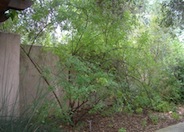
Common name:Blue Elderberry
Botanical name:Sambucus mexicana
The Blue Elderberry is a deciduous shrub that grows 4'-10' tall or tree that reaches up to 40' high. The leaves of this plant have 5-9 leaflets with white spring flower clusters developing into blue berries. The Blue Elderberry is a native to California, is drought tolerant and is a beneficial insect plant.
-Cornflower Farms
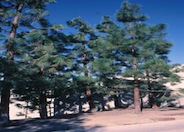
Common name:Canary Island Pine
Botanical name:Pinus canariensis
This graceful, slender-growing pine has a pyramidal form to about 70'. ITs needles are long and drooping inb bundles of 3. The foliage is a blue-green color, maturing to a dark green shade. Pines are highly combustible plants.
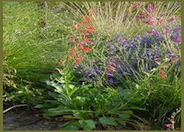
Common name:Scarlet Bugler
Botanical name:Penstemon centranthifolius
This herbaceous perennial has gray green leaves with showy scarlet flowers that bloom in spring. It requires excellent drainage.
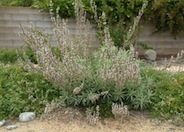
Common name:White Sage, Sacred White Sage
Botanical name:Salvia apiana
This woody shrub has long stems with silvery white leaves and fragrant white flowers that bloom in the spring. It provides a strong structural form as a garden focal point. It can reach 6' tall and 6' wide.
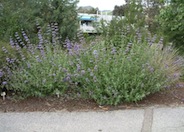
Common name:Purple or Gray Sage
Botanical name:Salvia leucophylla
The Purple Sage is an evergreen shrub that grows 2'-3' tall and 5'-6' wide. It has white stems and leaves and light purple flowers that bloom between May and June. This shrub tolerates heat and drought. The Purple Sage is a California native.
| Designer: AB Hessing | Picturesque Front Garden |
Photographer: GardenSoft |
Soils and Compost:
Physical weed control, including mulching, or hand removal protects the watershed from harmful chemicals.
Water Saving Tip:
Mulching and adding compost to soil can minimize evaporation and help soil absorb and store water.
Integrated Pest Management:
Remove irrigation water and fertilizer from areas where you don't want weeds to grow.
